‘The smallest thing in the world would hang us’ – Sylvester Poff to James Barrett
Sylvester Poff and James Barrett, hanged on 23 January 1883 for the murder of Thomas Browne on 3 October 1882, maintained their innocence to the end, and declared that they did not know who murdered Browne.
They did, however, know somebody who did know.
On the day of Thomas Browne’s murder, Poff and Barrett, on errands, and hunting rabbits in the area with a black dog, had been in the company of a man named John Dunleavy.1
The men had left Dromultan and walked to the nearby village of Scartaglen, from where Poff had to collect a letter. On the way, Dunleavy had said it was ‘a bad place to be that day’ as he had heard there would be ‘bad work that day.’
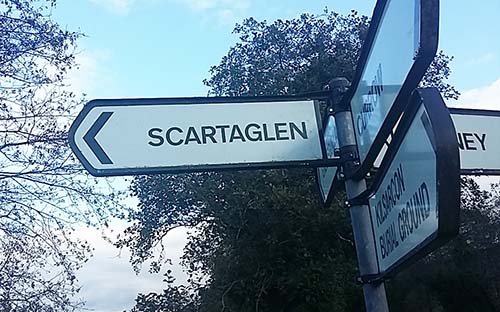
On the way they met Bridget Brosnan, who would later be the chief witness for the Crown at the trials. Mrs Brosnan had issues with John Dunleavy; he had poured a bucket of water and dung down her chimney during the last winter and ‘she would remember him for it.’2
There was a large number of strangers about that day for the funeral of Dr Roche of Listowel which passed through Scartaglen between two and three o’clock. Dunleavy, Poff and Barrett went first to Michael O’Leary’s public house in company with a man named Bartholomew O’Brien.3
From there they went to Hugh O’Connor’s, whose house was the post office, and they played cards. Later, they went to Horan’s public house before they separated.

Poff and Barrett left with Poff’s black dog in tow. They were seen by some schoolboys going in the direction of their houses about a mile away from Browne’s farm. Dunleavy, however, mindful, it seems, of events about to pass, remained in the pub. He wanted to ensure he was in the right place at the wrong time.
Dunleavy ‘turned different colours ‘
Soon after Poff and Barrett’s departure, news arrived of the murder of Thomas Browne. Dunleavy’s response was documented in statements made by Corporal William Livingstone and Private John Hind, but those documents were not used during the trial because by then, Dunleavy could not be found. Thomas De Moleyns, QC, Crown Prosecutor, informed the jury of this in his opening speech:
He might now state that Dunleavy had left the country and was not forthcoming; but he was in their [Poff and Barrett’s] company at that time, and at an antecedent period.
Livingstone, of the 2nd Battalion Rifle Brigade, had described what happened in Horan’s public house, Scartaglen, that afternoon:
I was in Scartaglen on Tuesday the 3rd October 1882 the day upon which Thomas Browne was murdered. I was in Horan’s public house there in company with Private Hind, John Dunlevy and three or four others whose names I do not know. We were playing cards while we were doing so news was brought in – I think by John Horan – that Thomas Browne was murdered. We stopped playing the cards and in a few minutes afterwards John Donlevy came over to me and asked me to take a note of his name and to bear in mind that should any accusation be made against him I could certify that he had been there in my company. The time that the news of the murder arrived, was as nearly as I can calculate a little after 5pm. I judge this from the fact that when leaving the house – which was from ¼ to 20 minutes after hearing of the murder – I looked at the clock in the house and saw that it was then 25 minutes past 5 o’clock pm. John Donlevy appeared rather excited when the news arrived and no other person save him asked me to take note of their presence nor did I hear them ask anybody else.4
Livingstone’s statement was corroborated by Private John Hind:
I was in Scartaglen village on Tuesday the 3rd of October, the day on which Thomas Browne of Dromulton was murdered – I was in John Horan’s public house in company with Corporal Livingstone, John Dunleavy, John Cronin, and two or three others whose names I do not know. We were playing cards. Just as we finished playing news came that Thomas Browne was murdered; I think it was first told to me by John Horan’s daughter – John Dunleavy appeared much excited on hearing it, and turned different colours – he said something but I do not remember what it was – after some little time we left the house, in order to start for home and John Dunleavy said to me that he wished to know my name – because he thought he would be arrested by the police for the murder. I gave him my name and told him to go home. I think it was about 25 minutes after five when we left John Horan’s house.5
In the days after the murder, Dunleavy was arrested and charged with having aided and abetted in the crime. He was put on remand while investigations were carried out. He was described as the son of a small tenant farmer named Dunleavy in the townland of Dromultan, the estate of Captain Fagan.6
Sub Inspector William Davis, RIC, and Sub Constables Alexander Weir and John Dallas all deposed that they had received information implicating Dunleavy in the offence. They sought to keep him in police custody.7
Poff looked to his priest for help
Throughout, Poff tried to find voice, albeit from a cell. He had informed the authorities about Dunleavy. Now he asked to speak to his local parish priest, Fr O’Leary of Ballymacelligott, and informed him that Dunleavy knew all about the murder.
Poff’s mother had clearly spoken to Dunleavy because she also went to Fr O’Leary and informed him that Dunleavy would tell the truth ‘if sworn.’8
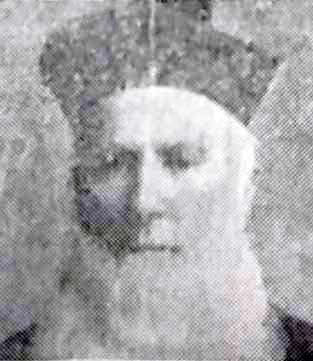
It seemed that everybody knew the truth but ‘justice’ had to be seen to be done.
‘The moment he was discharged from custody he bolted’
It would seem that the police had not sufficient evidence to hold Dunleavy. It was reported that the case against him had ‘broken down.’ He was brought before Heffernan Considine, RM, at the County Court House on Thursday 23 November at 4pm. The proceedings, which lasted for only a few minutes, resulted in the discharge of Dunleavy.9
However, what was described as ‘a curious incident’ occurred:
After Dunleavy had been discharged from custody and, in company with a few comrades, was leaving the courthouse, he was called back to the Grand Jury Room where he was detained for about ten minutes and was discharged again. The investigation was strictly private, the press being refused admission. The constables were ordered out.10
Resident Magistrate, Heffernan Considine, under examination during the second trial of Poff and Barrett, confirmed that John Dunleavy had been discharged about three weeks before the trial. He also stated that the police had been looking for Dunleavy for ‘the past ten days’ but had failed to find him.
On cross-examination by Mr Lawrence, Considine admitted that from the beginning Poff was denouncing Dunleavy who, he said, could tell all about the murder and who committed it. He claimed that at the close of the magisterial inquiry, he did not hear Poff urge Dunleavy to ‘tell the truth.’11
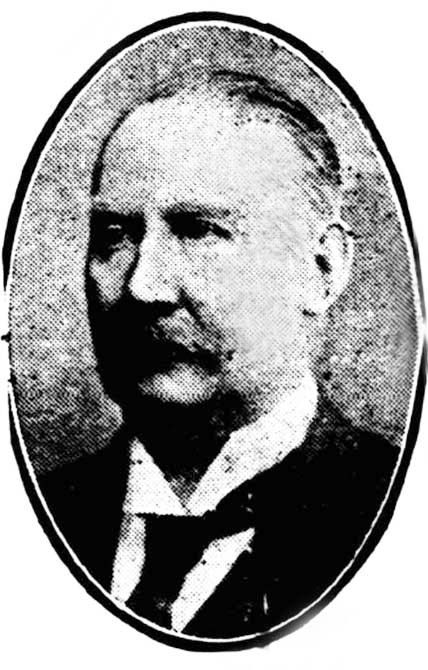
It is difficult to comprehend how the two trials of Poff and Barrett could have proceeded without the presence of a person of such central and crucial importance to the events. The question must be asked, why were the police searching for Dunleavy, if indeed searching they were at all? Dunleavy had been discharged. The police had not been able to charge him. Of what use was he to the Crown prosecution unless as a witness, perhaps a paid witness, to testify against Poff and Barrett?
Dunleavy was a far more important witness for the defence – as Dunleavy had informed Mrs Poff, he would tell the truth ‘if sworn.’ What had exchanged between Dunleavy and the authorities in the ‘strictly private’ courtroom on Thursday 23 November? Was he simply paid to disappear?
Dunleavy was caught between a rock and a hard place. If he testified against Barrett, his neighbour, and Poff, Barrett’s cousin, he was a dead man. If he swore the truth, that he knew the identity of the killer or killers of Thomas Browne, he would be on trial himself, if he was not murdered beforehand.
And so he bolted.
In court, the prosecution made light of Dunleavy’s absence as if it was of little consequence, yet the name Dunleavy appears repeatedly on the lips of the witnesses.
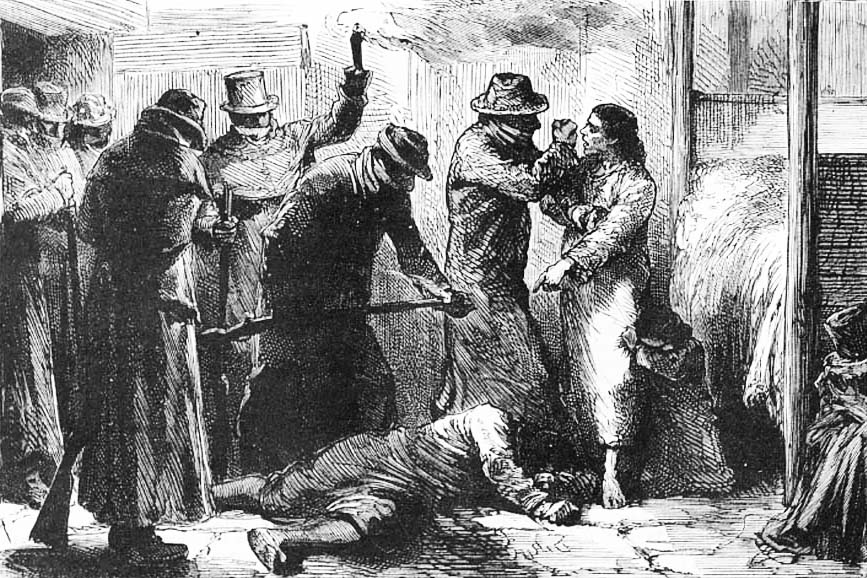
Poff was a stranger in Dromulton, where the murder occurred. He had been evicted from his farm at Mountnicholas, near Tralee, and had not long been released from prison, where he had been held under the Coercion Act, when the murder of Thomas Browne occurred.
It was suggested at the trial that Poff had been staying with Dunleavy. This, in the eyes of the prosecution, added up to a joint conspiracy between them because Poff, if he was innocent, would have warned Thomas Browne of potential danger. So reasoned Justice Barry in his summing up, but Poff had an explanation, and interrupted the judge to give it:
I was only a month in the place. I knew nothing about Dunleavy, or Browne, or Fitzgerald. It would be a queer thing if I were to leave my little family and go and shoot a man I didn’t know.
But it was too late for logic. It was too late for Poff, and too late for Barrett, justice was not on their side. In early January 1883, as Poff and Barrett awaited their fate in Tralee prison, it was rumoured that John Dunleavy was being held in Dublin Castle.12
This is the last we hear of him.
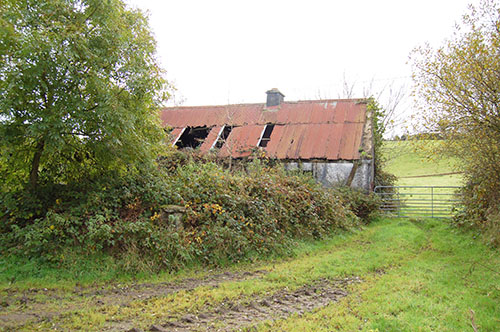
_________
1 A variety of spellings of the name includes Dunlevy, Donleavy, Donlevy, Dunleavey, etc. 2 There can be no doubt that Mrs Brosnan, chief witness, may have seen Poff and Barrett going into a field later that day but she did not witness the murder of Thomas Browne. She was at the gate with Mrs Browne when Thomas Browne was shot. Poff and Barrett had left the pub in Scartaglen and wandered right into the centre of the murder scene. Indeed, they, with the black dog in tow, had met some schoolboys on their way home a distance from Browne’s farm and had told one of them that they were hunting rabbits. At the inquest that day, Bridget Brosnan had sworn that she had seen three men go into the field. She would later explain this as because she had met Dunleavy, Poff and Barrett that morning, ‘she thought they had come back together’ (Freeman’s Journal, 20 October 1882). When asked about the identity of the three men, she had replied, ‘How do I know who they were’; the question was repeated and she said, ‘I told you what I know, and I’ll tell you no more.’ (Kerry Independent, 18 December 1882). 3 A transcription of the trial confirms this: Bartholomew O’Brien, examined by Mr O’Brien, stated – On the day Browne was murdered I met the prisoners and John Dunleavy in the village of Scartaglin. I went with them into Michael O’Leary’s public house; after that we went to the Post Office where we played cards; I think we left there at three o’clock, and then we went to Horan’s public house and had a couple of drinks there; there was present John Dunleavy, Poff and Barrett, a boy of the Lyons, and a boy named O’Leary; I then went into the kitchen, and after that I did not see Poff and Barrett; Dunleavy remained in the public house; I could not say it was a half an hour while we were in Horan’s; I remained there until I heard of the murder of Browne; Dunleavy was there all the time; I saw him talking to the soldiers. To Mr Sullivan – There were a good many strangers in Scartaglin that day at a funeral from Listowel; Poff had a large black dog with him. 4 Statement of William Livingstone, Corporal 2nd Battalion Rifle Brigade, 2 November 1882. Considine Papers. 5 Statement of Private John Hind of the Rifle Brigade, 3 November 1882. Considine Papers. 6 ‘William Fagan brought an ejectment against John Dunlevy from part of the lands of Drumultin for non-payment of rent, a year’s rent £25 17s 6d being due on the 29th September last. His Honor gave a decree for possession’ (Kerry Evening Post, 28 January 1880). ‘The following eviction notices were laid before the Board of the Tralee Union – William Fagan, plaintiff; John Dunleavy, Dromultin, Killeentierna, defendant’ (Kerry Weekly Reporter, 8 September 1883). 7 John Dunleavy charged that he, with others, did unlawfully conspire to kill and murder one Thomas Browne of Dromulton in the County of Kerry on the 3rd of October 1882 and was examined therein: I caused the Defendant, John Dunleavy, now present, to be arrested on above charge – I pray for a remand as I expect to be able to produce evidence to connect him with said charge. Deposition of William Davis, sub inspector, RIC, 14 October 1882. Considine Papers. I have reason to believe that I shall be able to obtain evidence to connect the said John Dunleavy with said offence if a remand be granted. I was informed by Sylvester Poff on the 13th of this month in Castleisland that John Dunleavy knew all about the murder of Thomas Browne. Deposition of Sub Constable Alexander Weir. 20 October 1882. Considine Papers. I have read the deposition of sub constable Alexander Weir on which the last remand in this case was made and I say that in consequence of a further statement made by the prisoner Sylvester Poff in reference to John Dunleavy I have reason to believe I will be able to produce further evidence against the said John Dunleavy if a further remand of eight days be granted. Deposition of Sub Constable John Dallas RIC. Considine Papers. Thomas Browne of Dromulton was murdered on the 3rd of October. I believe the prisoner John Dunleavy was concerned in said murder and I pray for a further remand until next Monday when I have reason to believe from information I have received that the case will then be in a position to be finally dealt with. Deposition of Sub Constable John Dallas, RIC. Considine Papers. Since last remand further information implicating the defendant John Dunleavy in the murder of the late Thomas Browne of Dromultan has reached me from Sylvester Poff and James Barrett so I pray a further remand of eight days to enable me to produce further evidence. Deposition of Sub Constable John Dallas, RIC. Considine Papers. 8 I beg to inform you that Poff expressed a wish to see Father O’Leary; the latter visited him today, the interview was not of much importance, he merely stated that Dunleavy knew all; that he was himself innocent. Mrs Poff (prisoner’s mother) told Father O’Leary that Donleavy said he would tell the truth if sworn. Davis to Considine, 30 October 1882. Considine Papers. A record of Fr John O’Leary (1821-1918) subsequently parish priest of Castleisland, with accompanying image, is contained in Fr Kieran O’Shea’s Castleisland Church and People (1981), p51. Rev Monsignor O’Leary died on 24 June 1918 at the Presbytery, Castleisland. 9 Kerry Independent, 27 January 1883. 10 Ibid and Northern Whig, 25 November 1882. Mr J C McGillycuddy, Sessional Crown Solicitor, conducted the case for the Crown, and Mr Neligan, solicitor, for Dunleavy. 11 Kerry Independent, 18 December 1882. 12 Dunleavy’s mother disputed this. In a letter to the Cork Examiner, 11 January 1883, she wrote from Droumulton, Scartaglen, on 8 January 1883 ‘Sir – I have heard that a report appeared in a recent issue of your paper from your Tralee correspondent, stating that my son, John Dunleavy, was in Dublin Castle giving information to the authorities. I must ask you to contradict this false statement as soon as possible as there is no ground for such a report. Your correspondent ought be more cautious than to publish such reports, injurious to the character of any individual, without the least foundation for doing so. Yours &c, Julia Dunleavy’. It has been suggested the family went to Canada.


